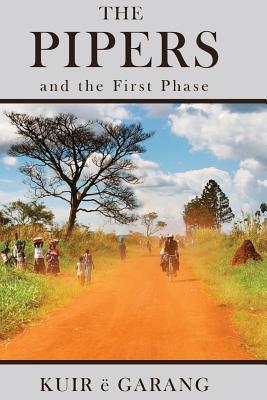Title: The Pipers and the First Phase
Author: Kuir ë Garang
Publisher: The Nile Press
ISBN: 978-0991678907
Pages: 456, Paperback/Kindle
Genre: International, Political, Conspiracy
Reviewed by: Jason Lulos, Pacific Book Review
Book Review
Africa’s complex political struggles are explored in this post-colonial, or post-post-colonial novel phase which delves into conspiracy, peaceful revolution, and perhaps most importantly, the international, national, and ideological conditioning of racial identities and race relations on an international scale. Aside from being an entertaining story about interwoven politics in Africa and its link to global economics, this novel highlights the equally complex relationships between the global binary, East and West, with all of its pros and cons. The novel’s plot fluctuates between the narratives of three main characters: the heritage seeking Little Michael, the wandering ex-cop Christopher Fox, and the part well-meaning/part profit-seeking philanthropist Isaac Burns.Each character is manipulated by certain political groups, both within Africa and internationally, and through these subjections, he struggles (often futilely but eventually with some success) to understand his own prejudices and the reality of the ways in which identities of races and cultures are conditioned on a global, societal scale. As each character tries to discover the motivations of each political group, the reader struggles along with him. This is, in fact, the point. The peaceful revolutionary group, “The Pipers,” works militantly but in a psychologically reconditioning sense. In order to give someone, Chris for example, a real understanding of what it’s like to be politically and racially marginalized, The Pipers keep him in the dark as to why he’s been chosen to take part in their secret and ingenious revolution. As Chris (and Little Michael and Isaac to other extents) tries to understand his role, he is given a glimpse of the perspective of one who has no political voice (subaltern), the perspective of one who asks questions and gets no answers. The perspective of one who is oppressed not only by a partially corrupt government and local political system but also one who is ideologically conditioned to think in certain stereotypical and blinding ways. This is the strength of this novel. As Chris, Little Michael, and Isaac slowly discover the ways they and we are conditioned to think, primarily about Africa and African cultures, the reader slowly discovers the frustration such African civilians and others marginalized and stereotyped by the West must live with on a daily basis.
That being said, the novel is not an outright denunciation of the West. It takes fair shots at all players in the East and the West. However, another interesting insight is provided on the duplicitous tendency of Western philanthropists who purport to give aid and service to African culture but do so only as it yields a monetary profit. It is an important look, therefore, on the West philanthropy in the East and raises questions: How much does such generosity benefit those intended and is it a seemingly well-intentioned guise for the further manipulation of those Eastern peoples? To what extent does a philanthropic act help those seemingly less fortunate and to what extent does the philanthropic act reestablish the relationship: reestablishing the philanthropist as the superior group while reconditioning the notion that the group “benefiting” from such generosity is therefore inferior and always already in need of such help. It is a convoluted, but important look at the political, ideological, and philosophical implications of international philanthropy and politics. Cue “The Pipers,” whose goal is more than liberation of the oppressed. It is to reeducate not only its ever-changing membership but the global community at large about the ideological groups who recondition stereotypes and international relationships.
I really appreciate the opportunity to read “The Pipers and the First Phase,” by author Kuir ë Garang so that I can see African history from another perspective. I highly recommend it to people who enjoy history, politics and seeking out the truth.


